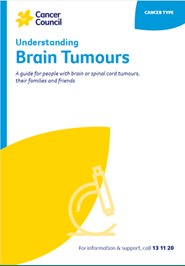- Home
- Brain tumours
- Treatment
- Making treatment decisions
Making treatment decisions
Sometimes it is difficult to decide on the type of treatment to have. You may feel that everything is happening too fast, or you might be anxious to get started.
Check with your specialist how soon treatment should begin, as it may not affect the success of the treatment to wait a short time. Ask them to explain the options, and take what time you can before making a decision.
Learn more about:
- Knowing your options
- Recording the details
- Asking questions
- Considering a second opinion
- Deciding on treatment
- Joining a clinical trial
- Video: What are clinical trials?
Know your options
Understanding the disease, the available treatments, possible side effects and any extra costs can help you weigh up the options and make a well-informed decision. Check if the specialist is part of a multidisciplinary team and if the treatment centre is the most appropriate one for you – you may be able to have treatment closer to home, or it might be worth travelling to a centre that specialises in a particular treatment.
Record the details
When your doctor first says you have cancer, you may not remember everything you are told. Taking notes can help. If you would like to record the discussion, ask your doctor first. It is a good idea to have a family member or friend go with you to appointments to join in the discussion, write notes or simply listen.
Ask questions
If you are confused or want to check anything, it is important to ask your specialist questions. Try to prepare a list before appointments. If you have a lot of questions, you could talk to a cancer care coordinator or nurse.
Consider a second opinion
You may want to get a second opinion from another specialist to confirm or clarify your specialist’s recommendations or reassure you that you have explored all of your options. Specialists are used to people doing this.
Your GP or specialist can refer you to another specialist and send your initial results to that person. You can get a second opinion even if you have started treatment or still want to be treated by your first doctor. You might decide you would prefer to be treated by the second specialist.
It’s your decision
Adults have the right to accept or refuse any treatment that they are offered. For example, some people with cancer choose treatment that has significant side effects even if it gives only a small benefit for a short period of time. Others decide to focus their treatment on quality of life. You may want to discuss your decision with the treatment team, GP, family and friends.
For more on this, see Cancer care and your rights.
Joining a clinical trial
Your doctor or nurse may suggest you take part in a clinical trial. Doctors run clinical trials to test new or modified treatments and ways of diagnosing disease to see if they are better than current methods.
For example, if you join a randomised trial for a new treatment, you will be chosen at random to receive either the best existing treatment or the modified new treatment. Over the years, trials have improved treatments and led to better outcomes for people diagnosed with cancer.
You may find it helpful to talk to your specialist, clinical trials nurse or GP, or to get a second opinion. If you decide to take part in a clinical trial, you can withdraw at any time. For more information, see Clinical trials and research.
To find current clinical trials near you, visit Cancer Institute NSW or Australian Cancer Trials.
→ READ MORE: Surgery for brain cancer
Video: Research And Clinical Trials
Podcast: Making Treatment Decisions
Listen to more episodes from our podcast for people affected by cancer
More resources
Prof Lindy Jeffree, Director of Neurosurgery, Alfred Health, VIC; Caitriona Nienaber, 13 11 20 Consultant, Cancer Council WA; Prof Tamara Ownsworth, Clinical Neuropsychologist and Research Director, The Hopkins Centre, Griffith University, QLD; A/Prof Hao-Wen Sim, Medical Oncologist, The Kinghorn Cancer Centre and Chris O’Brien Lifehouse, NSW; Megan Trevethan, Clinical Specialist Occupational Therapy – Cancer and Lymphoedema Services, Princess Alexandra Hospital, QLD; Chris Twyford, Cancer Specialist Nurse, Canberra Health Services, Cancer and Ambulatory Support, ACT; Dr Adam Wells, Clinical Academic Consultant Neurosurgeon, The University of Adelaide, Royal Adelaide Hospital, SA.
View the Cancer Council NSW editorial policy.
View all publications or call 13 11 20 for free printed copies.

